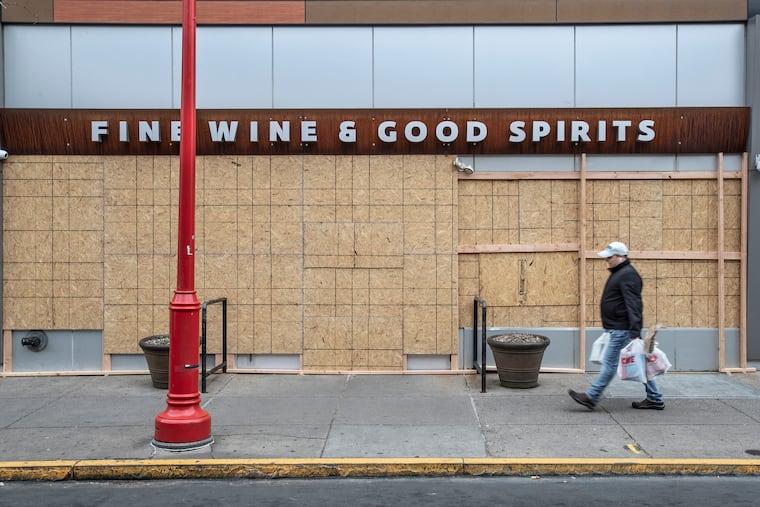Pennsylvanians angry at losing the liquor lottery may rethink privatization of State Store system
Pennsylvania's state-run liquor stores have been closed for more than three weeks. Delaware is turning away cross-border liquor shoppers. And Pennsylvanians can be cited for bringing home out-of-state liquor. Republicans in the General Assembly sense an opportunity for privatization.

Republicans in Pennsylvania’s House of Representatives spent the last decade pushing to privatize the state’s liquor stores. So far they’ve succeeded only in allowing grocery and convenience stores to sell wine and beer and expanding hours at the State Stores.
Now the political math could change in favor of privatization after the state’s coronavirus lockdown left hundreds of thousands of people angry they couldn’t buy booze. By order of the governor, 600 stores have been closed statewide for more than three weeks, and an online sales effort has satisfied few customers.
Speaker Mike Turzai, an Allegheny County Republican who led the privatization charge, thinks the consumer experience from the 2016 legislation that expanded beer and wine sales demonstrates that state-run liquor stores are “really irrelevant in the 21st century.”
“Sometimes incremental [change] in Pennsylvania is revolutionary,” Turzai said. “And in that regard, it changed the chessboard.”
While grocery stores, bars, and beer distributors can sell wine and beer to go, the Liquor Control Board’s own statistics show just how thirsty Pennsylvanians are for the hard stuff.
More than two million people tried nearly 13 million times to access the state’s website for online sales for the week ending Wednesday. Just 9,590 orders were successfully placed, shipped from three locations in Montgomery, Allegheny, and Luzerne Counties.
Like all state-run lotteries, there are way more losers than winners here.
Pennsylvanians have been driving to New Jersey and Delaware, where privately run liquor stores are still open. But Delaware is now turning back those customers. And Pennsylvania state troopers can cite someone bringing in out-of-state liquor purchases.
Wendell Young IV, president of the union that represents Pennsylvania liquor store workers, sees a looming threat of re-energized privatization efforts. The state is paying those union workers through Friday. After that, they must use vacation, enjoy unpaid leave, or file for unemployment benefits.
“Our members are eager to get back to work,” Young said. “They, more than anyone, understand this target of privatization is always on their backs.”
Young, who praises Gov. Tom Wolf and the LCB for efforts to protect liquor store workers and customers, is pushing a proposal to expand sales by allowing customers to order online from about a third of the stores, with curbside pickup.
Turzai has a plan, too. And he knows the field. The House voted in favor of full privatization four times from 2013 to 2015. Wolf in 2015 vetoed the only privatization bill that reached his desk.
Turzai predicts the House will start with full privatization, pushing to phase out State Stores over two to four years while allowing grocery, convenience and specialty stores to start selling liquor. If that falters, a compromise bill would allow those private sales while keeping State Stores open.
“I think Gov. Wolf would have significant public pressure to sign the bill or let the bill become law,” Turzai said, citing what he sees as growing frustration from customers.
Turzai faces some pressure on accomplishing this goal. He is leaving the legislature for the private sector at the end of this year.
Sheriff’s Office presses on, for now, with controversial practice
It’s expensive. It’s controversial. And Sheriff Rochelle Bilal, who ran as a reformer last year, is keeping the practice in place. At least for a while.
Her office on Monday hired an outside firm to handle advertising for sheriff’s sales for at least three months. That firm is run by political consultant Teresa Lundy, who ran Bilal’s campaign last year. Lundy will also handle media inquires for the office.
The last contract, held by Barbara Grant and Luz Cardenas, expired March 31. They collected $719,320 in commissions on $6.3 million in advertising in fiscal year 2019, while Sheriff Jewell Williams was in charge. Bilal defeated Williams in the 2019 Democratic primary.
Brett Mandel, Bilal’s first chief financial officer, lasted just five weeks. He was fired five days after he criticized the practice in a memo, noting staffers could do the work for less money, with some of the savings going back to people whose homes were sold in foreclosure.
The Sheriff’s Office won’t comment on Mandel’s dismissal. But maybe some of his ideas survived?
Bilal says she will put the contract out to bid and is mulling changes, “looking at areas which we can bring in house and do ourselves in the Sheriff’s Office.”
Senator learns the perils of talking trash while Zooming
State Sen. Bob Mensch marveled Tuesday at an unexpected benefit of virtual sessions on Zoom.
The Berks County Republican told someone in his office he could “stare daggers” at State Sen. Katie Muth, a Democrat from Montgomery County. “And she doesn’t even know it,” the person replied.
One big problem: Mensch’s microphone was hot.
So Muth knew it. As did everyone else paying attention.
Senators had been warned that their microphones remain active when they gather in a “Zoom Room,” as the temporary virtual chamber has been dubbed.
Mensch later apologized without mentioning Muth by name, dubbing it “an off-handed comment” and “a personal observation.”
Muth, an outspoken freshman who has clashed with colleagues on personal and policy issues, said she wanted the focus to be on “meaningful legislation” rather than personal barbs.
“It’s unfortunate that misogyny seems to be able to beam through even a virtual workplace, even in a pandemic,” Muth said.
Gillian McGoldrick of LNP | Lancaster Online contributed to this article.